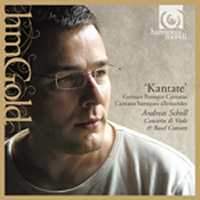Texte paru dans: / Appeared in: |
|
 |
Outil de traduction (Très approximatif) |
|
Reviewer: Nicholas Anderson
One of the most satisfying of Andreas Scholl's previous solo recitals is of secular German baroque songs (Harmonia Mundi, 5/95). More than the many other discs which have followed it, the programme provided a forum for expressive variety. This new release is something of a companion volume, one of German sacred arias and cantatas, belonging to the same period, and revealing the opposite side of a coin .
Expressively versatile though Scholl unquestionably can be, it is perhaps in the sphere of elegy and plaint that his art can be heard to strongest advantage. Two pieces of outstanding merit fall into this category and are sung here with tonal beauty, stylistic assurance and expressive puissance. One of them is Johann Christoph Bach's lament Ach, das ich Wasser's g'nug hätte. This member of the family worked during the second half of the seventeenth century and was greatly admired by J. S. Bach, who described him as " profound". The lament, in da capo form, is scored for countertenor, violin, three violas da gamba , cello and organ. The other is the much better-known strophic "Klag-Lied" from the longer Fried- und Freudenreiche Hinfahrt by Buxtehude, written in memory of his father who had died early in 1674. Scholl does great justice to each of these intimate pieces, attending as much to the spirit and utterance of the texts as to the sorrowful and at times searing inflexions of the music.
These performances alone would be sufficient enticement to acquire the disc but, happily, there is much else in the programme to touch our sensibilities. Schütz is well represented with three tenderly expressive pieces, two of them from the Kleiner geistlichen Conceten and a third from the Symphoniae sacrae (1647); and Franz Tunder by a declamatory and rhythmically graceful setting of a verse of the hymn Herzlich lieb hab ich dir, O Herr. This piece is one of two whose composers have been wrongly exchanged on the track listing: the other is Salve mi Jesu which, though preserved in a Tunder manuscript, is probably the work of the Venetian, Giovanni Rovetta.
Sensibly, the
order of events is punctuated by two works for instrumental ensemble, one of
them by Ignazio Albertini, the other by Legrenzi whose position in the history
of recording seems still to be that of occasional stand-in. He deserves better,
and doubtless will come into his own one of these days. The playing of the two
groups, Concerto di Viole and the Basle Consort, is accomplished and refined,
both in ensemble and tuning, providing sensitive support in the vocal pieces and
affecting insights to the instrumental ones. Despite the fanciful (if ingenious)
packaging, which is brittle, inconvenient and impractical, this is strongly
recommended. ~~~~~~~
This survey of German Baroque cantatas by the likes of Buxtehude, Tunder, Schütz and JC Bach fully deserves its reissue in Harmonia Mundi's Gold series. There are similar anthologies by countertenors (Gerard Lesne, Daniel Taylor, Michael Chance and Robin Blaze, to name just a few) which all offer something special, but I would not be surprised if future generations look back upon this recital as Scholl's finest hour (plus another 12 minutes). That is not to say that his best years might not still be ahead, but the union of youtful timbre, sublime instrumental playing and explorative repertoire achieves a rare kind of perfection here. Scholl's singing is remarkably pure and effortless, and possesses palpable eloquence and empathy for the texts. JC Bach Ach, dass ich Wassers g'nug bätte is notable for the beautifully shaded viols, and also for Scholl's breathtaking ability to move from lyrical passion to immaculately controlled pianissimo singing. This is essential for lovers of Baroque vocal music. |
|
|
Support
us financially by purchasing this disc from
eiher one of these suppliers.
|
|
|
|
|
|
Cliquez l'un ou l'autre
bouton pour découvrir bien d'autres critiques de CD |
|




